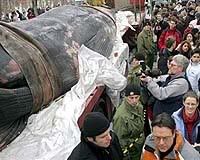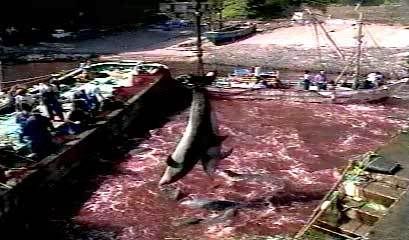
Japan to sell whale meat to hospitals and bars after expanding kill quota:
Japan will try to sell whale meat at cheaper prices to hospitals, bars and restaurants after expanding its hunt in defiance of international protests, a fisheries official said Wednesday.
Environmentalists, who believe Japan's hunt is cruel and driving the mammals to extinction, have already been outraged by the glut of whale meat and the growing number of schools putting it on the menu.
The marketing drive will be part of the mission of a new whale meat trading company set up on May 1 by Japanese government agencies.
"Despite an increase in the supply of whale meat in recent years, our distribution channel was severely regulated and inefficient," said Hideki Moronuki, chief of the whaling section of the Fisheries Agency.
"We expect the new company to explore different sales routes including hospitals, popular bars and restaurant chains," he said.
"As whale meat is full of protein and low-fat -- good traits for health -- the new sales company is targeting hospitals as one of its consumers," he said.
"We hope whale meat will be enjoyed by as many people as possible at a lot cheaper price, hopefully at the same price as tuna."
Japan last year doubled its annual kill to about 850 minke whales and extended the hunt to other whales considered endangered.
Arguing that whale meat is part of its traditional diet, Japan has studiously ignored international protests, including Greenpeace and other environmentalists who dogged the Japanese fleet in the Antarctic from December.
If it was part of the Japanese' "traditional diet" there wouldn't be a glut, and they wouldn't be trying to develop a market, by feeding it to captive markets: Patients in hospitals and children in schools.
But in a rare victory, fishing giant Nissui and four other firms recently donated their shareholdings in an existing whale company to the government after Greenpeace launched a pressure campaign targeting their other products overseas.
Japan officially stopped whaling in the 1987-1988 season in line with an international moratorium.
But it has since used a loophole that allows "research" whaling, while making no secret that the meat ends up on Japanese dinner tables.
"It is a common knowledge for biologists that research with killing is necessary to know basic information of whales such as age and sex," Moronuki said, in a position disputed by Western scientists.
 During drive hunts, fishermen panic and confuse migrating pods of dolphins and other small whales with loud banging, then herd them, by the hundreds, into shallow coves, and then butcher them one by one. Every year, some 20,000 small cetaceans of several species, some of which are endangered, including bottlenose dolphins, striped dolphins, spotted dolphins, Risso’s dolphins, short-finned pilot whales, white-sided dolphins, and false killer whales, are killed or taken in the drives, sometimes illegally. The hunts have been universally condemned by marine experts around the world as brutal, inhumane, and unsustainable, but pleas to stop them have fallen on deaf ears. Therefore, we, marine scientists and zoo and aquarium professionals, are asking for your support to bring this unconscionable practice to an end. [More]
During drive hunts, fishermen panic and confuse migrating pods of dolphins and other small whales with loud banging, then herd them, by the hundreds, into shallow coves, and then butcher them one by one. Every year, some 20,000 small cetaceans of several species, some of which are endangered, including bottlenose dolphins, striped dolphins, spotted dolphins, Risso’s dolphins, short-finned pilot whales, white-sided dolphins, and false killer whales, are killed or taken in the drives, sometimes illegally. The hunts have been universally condemned by marine experts around the world as brutal, inhumane, and unsustainable, but pleas to stop them have fallen on deaf ears. Therefore, we, marine scientists and zoo and aquarium professionals, are asking for your support to bring this unconscionable practice to an end. [More]Before the suspension of commercial whaling, Japan killed 20,000 tons worth of the meat each year.
The figure dropped dramatically to 1,500 tons immediately after the ban, but has risen to 3,000 tons in the 2000 fiscal year and 4,000 tons in the last fiscal year, Moronuki said.
Technorati Tags: Technorati Tag, Technorati Tags, tags, categories, International Whaling Commission, IWC, oceans, animal welfare, environment, Japan, The Constant American, Constant American


No comments:
Post a Comment